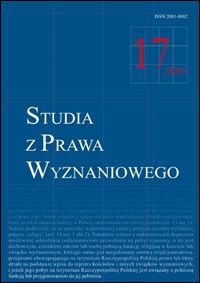Prawo do nauki a prawo rodziców do zapewnienia wychowania i nauczania zgodnie z ich przekonaniami w orzecznictwie Europejskiego Trybunału Praw Człow..
The right to education versus the right of parents to ensure such education and teaching in conformity with their own convictions in ECHR case law
Author(s): Jacek FalskiSubject(s): Law, Constitution, Jurisprudence
Published by: Katolicki Uniwersytet Lubelski Jana Pawła II - Wydział Prawa, Prawa Kanonicznego i Administracji
Keywords: Human rights; European Court of Human Rights; ECHR case law; European Convention on Human Rights and Fundamental Freedoms; Right to education; Right of parents to ensure education and teaching in conformity with their own convictions
Summary/Abstract: European Court of Human Rights case law, based on the European Convention on Human Rights and Fundamental Freedoms, regards the right to education, as per Article 2 of Protocol No 1 to the Convention, as “essential for the exercise of human rights.” The paper discusses and summarizes the current status of ECHR case law in the subject matter with a particular focus on the issue of the right of parents for respect of their convictions, including the religious ones, in the context of the exercise of the right to education. It also addresses the consequences of the translation of such parental convictions into children’s rights. The Strasbourg Court associates the requirement to protect parents’ convictions related mainly to the freedom of conscience and religion with the pluralism of ideas, the latter being one of the foundations of a democratic society. In this context, the Court also protects parental convictions against improper, excessive proselytism of the state as far as the educational process is concerned. Parents’ unreasonable proselytism within the scope of the exercise of the right to education is also unacceptable. Since the 1970s, case law in this respect has developed. It reflects the Court’s attempts to create a compromise between the protection of children’s rights and the respect of the rights of parents, while the child’s interests are always regarded as a priority.
Journal: Studia z Prawa Wyznaniowego
- Issue Year: 2014
- Issue No: 17
- Page Range: 151-172
- Page Count: 22
- Language: Polish

